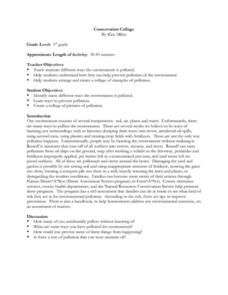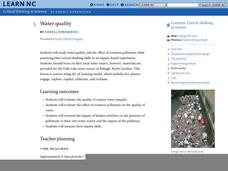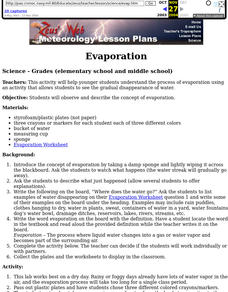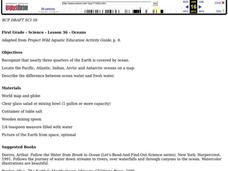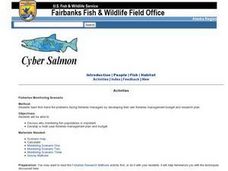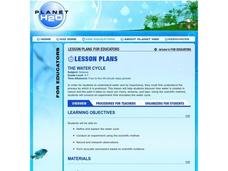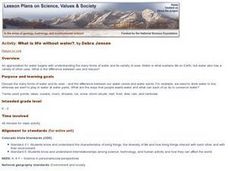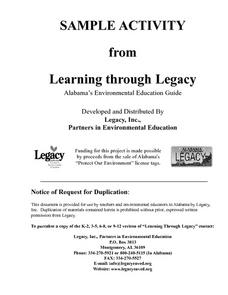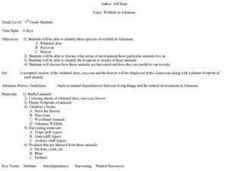Curated OER
Conservation Collage
Students identify many different ways the environment is polluted, and determine ways to prevent pollution. They create a collage of pictures describing how the earth becomes polluted.
Curated OER
Water Quality
In this unit of lessons, students examine the quality of water. They create poems and make observations about the quality of water. They also examine hot spots and the quality of water in the Great Lakes.
Curated OER
Water Pollution Graphing Activity
Students describe and identify the link between land use activities within a watershed and water quality. They evaluate the quality of a "water sample" ( a bag of skittles), graph their results, and form a hypothesis about the land use...
Curated OER
Understanding Salinity
Students discuss why the ocean is salty. They discuss what salinity is. Students are told that is they want to know how much salt is in a body or water, they would use a special scientific tool. They complete an Estuarine Layers science...
Curated OER
Water and Rice Agriculture
Second graders investigate the agriculture of rice by reading a study guide. In this food making lesson, 2nd graders read about the irrigation of rice fields used for harvesting. Students write three sentences about the rice irrigation...
Curated OER
Evaporation
Students explain the process of evaporation using an activity that allows students to see the gradual disappearance of water.
Curated OER
Junior Engineering Surface Water
Students experience the effects of pollution and erosion on a model of a watershed and explore ways to change the outcome.
Curated OER
Oceans
First graders recognize that nearly three quarters of the Earth is covered by ocean. They locate the Pacific, Atlantic, Indian, Arctic and Antarctic oceans on a map. They describe the difference between ocean water and fresh water.
Curated OER
Urban Impact on Chollas Creek (California): A Field Study
Students, in groups, take samples from a creek and keep a field journal on their samples. They also perform tests on their samples.
Curated OER
'Water, Water Everywhere...'
Fourth graders explore how the Utah pioneers used irrigation to make the desert 'blossom as a rose'. They use geographical tools to analyze political and physical features of Utah, the United States, China, and Asia.
Curated OER
Fisheries Monitoring
Students discuss why monitoring fish populations is important. They develop a multi-year fisheries management plan and budget.
Curated OER
The Water Cycle
Students research the water cycle and identify main vocabulary associated with the water cycle. They build and observe a closed system model that demonstrates the water cycle in action.
Curated OER
Take a Dip: Be a Field Guide
Students create a Visitor's Field Guide for the local area in order to enhance the understanding of natural features of the area for those who may be unfamiliar with the area.
Curated OER
The Water in Our Lives: Kit Practice
Learners examine a local water source using testing kits to determine water qualitiy. They identify the pollutants and contaminants in each sample. They determine if samples fall within an acceptable range for drinking water.
Curated OER
Is it Partly Cloudy or Partly Sunny?
Students investigate the concept of weather and how it is created. They review relevant vocabulary related to weather. Students predict weather given slight background knowledge. The lesson includes background information for the...
Curated OER
What is Life Without Water?
Students differentiate between how they use water in response to a need and how they use water for pleasure. They read books about water, participate in class discussion and illustrate their observations.
Curated OER
From Ground to Water
Students explore groundwater and issues relating to groundwater. They discus the problems involving groundwater. Students write a newspaper story addressing groundwater problems. They create a comic strip addressing groundwater...
Curated OER
The Effect of Medications on Daphnia
Students explore how human beings affect the world's ecosystem by examining the affects of medication on daphnia, a small freshwater organism very sensitive to pollution. Students use a computer model to repeat the experiment and analyze...
Curated OER
Pond 1: Pond Life
Students work together to investigate familiar and unfamiliar ecosystems. Using the internet, they discover how different organisms use their environment to satisfy their needs. They also examine the relationshiops between organisms...
Curated OER
Posters and People
Students create and design posters reflecting the types of litter harmful to aquatic wildlife. They explain the dangers of fishing line to aquatic wildlife, plastic bags to dolphins, and fish nets to fish. They design a poster to...
Curated OER
The Inside Current
Eighth graders explore ocean currents and wind patterns. They discover the concept of systems to show how change in one component of a body of water, causes change in other components in that system. Students describe positive and...
Curated OER
Wildlife in Arkansas
First graders identify three species of wildlife in Arkansas. They discuss the environment in which the whitetail deer, raccoon, and beaver live in. They identify the footprints of each animal and discuss how the animals are harvested...
Curated OER
The Driving Force
Pupils work in groups and note similarities and differences between their boats: size, shape, color, and unique features. They discuss 3 typical means of propulsion: propellers, sails, and paddles then share their charts with the class.
Curated OER
Where is Water Found?
Fourth graders examine the amount of water and its distribution on Earth. As a class, they brainstorm a list of where water can be found and classify the places according to salt water, fresh water or glaciers. They estimate how much...
Other popular searches
- Rivers and Streams
- Create Rivers and Streams
- Rivers and Streams Fl
- Rivers and Streams Lab
- Rivers and Streams Biomes
- Rivers Lakes Streams
- Rivers, Lakes, Streams
- Rivers and Streams Bio Mes
- Rivers Streams


